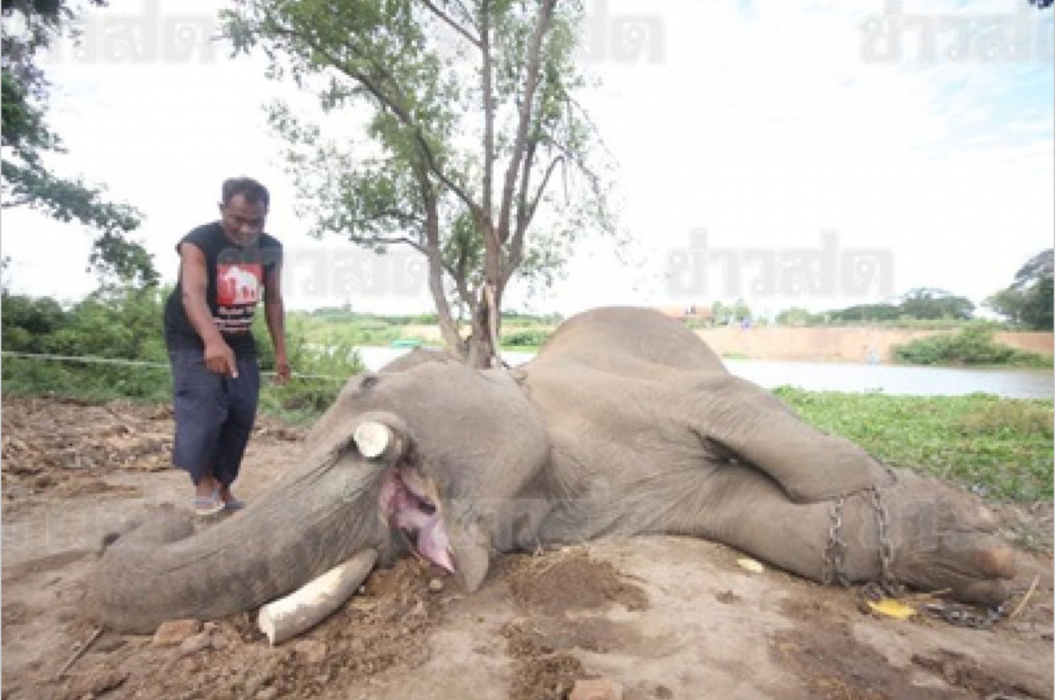Police are searching for poachers who murdered a 50-year-old elephant at an Ayutthaya province elephant camp on Friday.
The giant animal, nicknamed Klao, was found dead with his tusks sawed off inexpertly, and police suspect local teenagers might have killed Klao with the hope of selling the ivory on the black market. Khaosod reported.
“I wonder what the hearts of the culprits are made of. How could they be so cruel to elephants like this?” said Pan Sala-ngam, the mahout, or elephant keeper who cared for Klao.
Klao had appeared in royal events and the 2004 film “Alexander.”
According to Pan, Klao had been ostracized from his 30-strong elephant herd to live outside the Wang Chang Lae Paniad elephant enclosure due to his aggressive behavior. No one was watching over Klao that night.
The mahouts said they can’t protect the elephants without weapons.
“Previously, mahouts were given rifles and patrolled at night to look out for elephant killers, but recently the [military junta’s] National Council for Peace and Order cracked down on the possession of firearms so mahouts have only been able to ride motorcycles to check on the elephants,” said Laithongrian Meepan, owner of the enclosure.
Police believe Klao was killed after having eaten a banana stuffed with sleeping pills, fed by perpetrators who snuck into the unguarded field at night.
Pan estimated that the crudely removed tasks could fetch at least THB60,000 on the ivory market, which is only a fraction of what would be paid for an expertly removed tusk.
With a proper permit, the sale of ivory from domesticated elephants remains legal in Thailand.
Klao’s death came on the same day global regulators threatened the kingdom with serious sanctions if it doesn’t clean up its trafficking problem, soon.
According to animal rights organisation World Wildlife Fund, Thailand is the world’s largest unregulated ivory market. The group has repeatedly called on Thailand to ban its domestic ivory trade, arguing that it is extremely difficult to distinguish between domesticated and wild ivory.
However, Thailand’s recent governments have refused to meaningfully heed these calls and only made vague promises to halt the trade. At the 2013 Convention on the International Trade of Endangered Species (CITES), then-Prime Minister Yingluck Shinawatra declined to enact legislation that would ban the trade.
According to a recent report by wildlife-advocacy group TRAFFIC, at least 50 elephants, mainly calves, are “laundered” annually from Myanmar to Thailand for use in the tourism industry.
“The Asian Elephant is the forgotten elephant,” said Joanna Cary-Elwes, campaigns manager of wildlife NGO Elephant Family. “It needs government support now more than ever. If the capture and smuggling of calves is not stopped, some of the last great wild populations of the species are at risk of extinction.”
As for the killing of Klao, police said they are investigating the matter.
“The illicit removal of tusks and sale of ivory is an issue that many countries are opposing,” said Pol.Maj.Gen. Sermkid Sitthichaiyakan. “It causes great damage to Thailand’s reputation. We will find the perpetrators.”
Photo: Khaosod
Related: Thailand faces stiff sanctions over rampant ivory trade





Reader Interactions